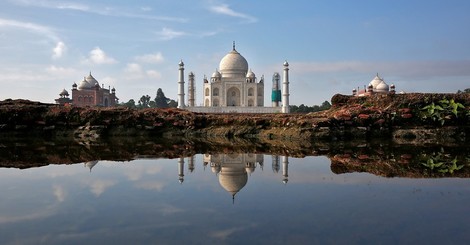Your podcast discovery platform
Curious minds select the most fascinating podcasts from around the world. Discover hand-piqd audio recommendations on your favorite topics.

piqer for: Technology and society Global finds Globalization and politics
Emran Feroz is an Afghan-Austrian journalist currently based in Stuttgart, Germany. He is regularly writing from Afghanistan, often focusing on the Middle East, Central Asia, drone warfare, refugee policies and human rights. Emran is writing in both German and English. His work has already appeared in international media outlets such as Al Jazeera, The Intercept, Alternet, The Atlantic or the New York Times and in various German and Austrian news papers and magazines.
Hindu Nationalists' New Target Is The Taj Mahal
The Taj Mahal is one of India's most famous symbols.
Built in the 17th century, the grieving Mughal emperor Shah Jahan used 20,000 laborers over two decades to construct the enormous mausoleum for his beloved wife, Mumtaz Mahal, after she died.
Since 1983, the Taj Mahal is listed as a UNESCO World Heritage Site. More than 7 million people visit the building each year.
However, there is a political movement in India that does not like the Taj Mahal: The Bharatiya Janata Party (BJP).
The BJP government of Uttar Pradesh, the largest state in India, chose not to include the historical building in the state’s tourism brochure.
And this was not done by mistake. The right-wing, nationalist BJP is known for its effort to promote Hindutva, an ideology that seeks to place Hindu faith, culture, and history at the core of Indian identity.
But like many other Indian kings, Shah Jahan was a Muslim.
The BJP views the presence of "foreigners" throughout history as corrupting Indian civilization. In this context, the party's main target is the subcontinent's Muslim history.
Indian prime minister Narendra Modi comes from the BJP too. Once, he himself referred to India's Muslim period of history, along with British colonialism, as a period of slavery.
In 2002, when anti-Muslim riots took place in Gujarat and killed more than 1,000 people, Modi was the state's chief minister.
Many Muslims know that the BJP is their enemy. Anti-Muslim racism and Islamophobia grew intensely since Modi took over. Regularly, leading BJP members question the loyalty of Indian Muslims, who make 15 percent of the population.
The article makes clear how the BJP's attack on the Taj Mahal should be viewed:
"The challenge to the Indian-ness of the Taj Mahal is a challenge to the Indian-ness of Muslims."
Stay up to date – with a newsletter from your channel on Global finds.
